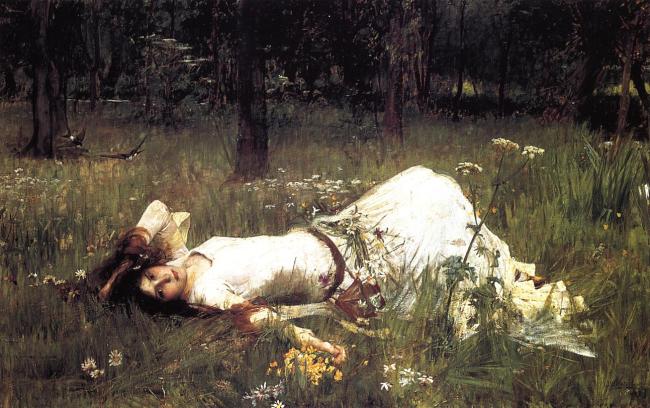One of the greatest paradoxes of the Elizabethan plays of the XVIth century was that even though women were not allowed to enter the stage, their role in the script was crucial. Hamlet’s Ophelia has become an icon of women’s role in life. It definitely is one the highest contributions of the bard to the historical knowledge. Today, women’s role in society continues to follow a difficult pace even though it certainly has gained a lot of dignity. This is why it is interesting to analyze Shakespeare’s character in order to discover some interesting dimensions of women’s character.
A lot of experts have decided to collaborate in these researches about the well-known Ophelia. Elaine Showalter is one of them. She is an American literary critic and teacher, and founder of gynocritics, a school of feminist criticism concerned with “woman as writer…with the history, themes, genres, and structures of literature by women.” (“Elaine Showalter”. Encyclopaedia Britannica).
In Representing Ophelia: Women, Madness, and the Responsibilities of Feminist Criticism, Showalter describes some intrinsic aspects of Shakespeare’s heroine’s personality. Let’s try to adapt her research to today questions.
First it is curious to highlight that Shakespeare gives us very little information from which to imagine a past for Ophelia. She appears in only five of the play’s twenty scenes; the pre-play course of her love story with Hamlet is known only by a few ambiguous flashbacks. Her tragedy is subordinated in the play; unlike Hamlet, she does not struggle with moral choices or alternatives. Thus another feminist critic, Lee Dewards, concludes that it is impossible to reconstruct Ophelia’s biography from the text: “We can imagine Hamlet’s story without Ophelia, but Ophelia literally has no story without Hamlet” (Showalter).
So is it possible to describe this pattern as the common one for women? It would be interesting that our readers reflected on this topic; both men and women. Thus, one should try to find out whether it is true that through history, women have had nothing to do without men. Personally, I would definitely deny it.
Furthermore, in French theoretical patriarchal language and symbolism, it remains on the side of negativity, absence, and lack. In comparison to Hamlet, Ophelia is certainly a creature of lack. “I think nothing, my lord,” she tells him in the Mousetrap scene, and he cruelly twists her words (Showalter):
Hamlet: That’s a fair thought to lie between maids’ legs./Ophelia: What is, my lord?/Hamlet: Nothing./(III. ii. 117-19)
Then, some views argue that Ophelia represented nothing but women’s insanity –believed to be widespread among females. The Elizabethan theatre’s symbolic elements tend to confirm this view: Ophelia dresses in white, decks herself with “fantastical garlands” of wild flowers and enters, according to the stage directions of the “Bad” Quarto, “distracted” playing on a lute with her “hair down singing.” Her speeches are marked by extravagant metaphors, lyrical free associations, and “explosive sexual imagery.” She sings wistful and bawdy ballads, and ends her life by drowning (Showlater).
Today many people tend to –consciently or not- declare women’s insanity as a trend. This –again personally- is definitely unforgivable. Shakespeare’s view of his heroine, is supposed to be watched as a caricature nowadays and if not, there must be a problem. How is it possible that five centuries later some people maintain the same view?: Clinically speaking, Ophelia’s behaviour and appearance are characteristic of the malady the Elizabethans would have diagnosed as female love-melancholy, or erotomania. From about 1580, melancholy had become a fashionable disease among young men, especially in London, and Hamlet himself is a prototype of the melancholy hero. Yet the epidemic of melancholy associated with intellectual and imaginative genius “curiously bypassed women.” Women’s melancholy was seen instead as biological and emotional in origins. (…) From 1660, when women first appeared on the public stage, to the beginnings of the eighteenth century, the most celebrated of the actresses who played Ophelia were those whom rumour credited with disappointments in love. The greatest triumph was reserved for Susan Mountfort, a former actress at Lincoln’s Inn Fields who had gone mad after her lover’s betrayal (Showalter).
In the eighteenth century, madness was adapted to the new stage and Ophelia’s sentiments were re-interpreted to adapt them to women’s sensibility. This was supposed to be an attractive feature for men. Again, women were publically represented as mere objects that were called to attract men: Her lines were frequently cut, and the role was often assigned to a singer instead of an actress, making the mode of representation musical rather than visual or verbal (Showalter). This was again not dignifying enough for the female sex. This new romantic view of Shakespeare’s heroine rapidly spread into the rest of the world’s representations. It was kept until the twentieth century as it was considered to attract higher rates of audience: The romantic critics seem to have felt that the less said about Ophelia the better; the point was to look at her (Showalter).
Nowadays, Hamlet’s representations vary from one view to another. The artistic companies adapt the character to what is believed to be better understood according to the social context. Usually is the second view which is applied. Does this have a further intention than merely smashing the box office?
 (John William Waterhouse, 1889)
(John William Waterhouse, 1889)
References
–Showalter, Elaine. Representing Ophelia: Women, Madness, and the Responsibilities of Feminist Criticism. Works on William Shakespeare: E Showalter, W Shakespeare, SL Wofford, 1994 (docenti2.unior.it). Retrieved on December 10, 2013 in http://scholar.google.es/scholar?hl=es&q=Showalter%2C+Elaine.+Representing+Ophelia%3A+Women%2C+Madness%2C+and+the+Responsibilities+of+Feminist+Criticism.+&btnG=&lr=
Archivado en: Big entries, General Information, Shakespeare Master Works Today Tagged: Elaine Showalter, Hamlet, Ophelia, William Shakespeare
![]()